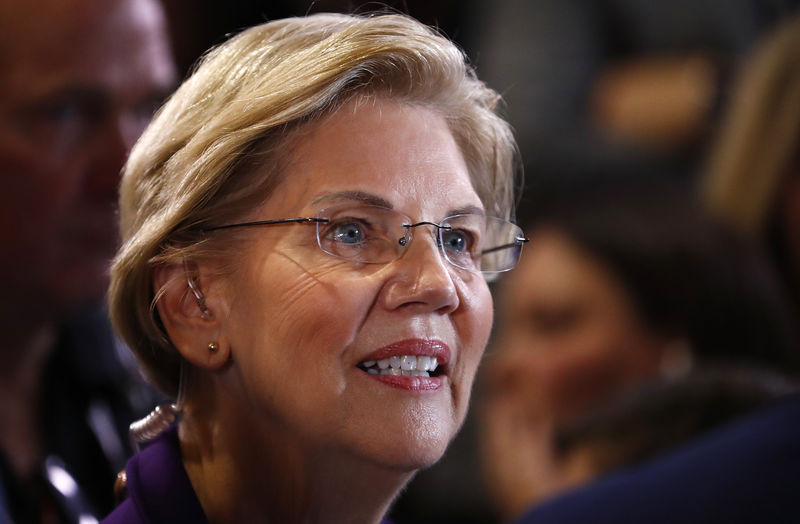By Howard Schneider
WASHINGTON (Reuters) - From 1982 to 2018 the share of U.S. wealth held by the 400 richest Americans is estimated to have grown from 1% to around 3.5%, or probably around $3 trillion.
According to Emmanuel Saez and Gabriel Zucman, the University of California at Berkeley economists who developed that estimate, that is in part because the wealthiest American families declare only a small portion of their actual economic gains in any given year as income, while leaving the rest invested in stocks and other assets, to grow in value.
Saez has been involved in a series of what are considered groundbreaking studies of U.S. income, inequality and economic mobility that involved both developing techniques to impute income based on holdings of wealth, and extensive access to U.S. Internal Revenue Service records.
He and Zucman have collaborated on several papers on the topic since 2014, and recently published “The Triumph of Injustice: https://taxjusticenow.org/# How the Rich Dodge Taxes How to Make Them Pay.”
"The greatest injustice of the U.S. tax system today is its regressivity at the very top: billionaires in the top 400 pay less (relative to their true economic incomes) than the middle class," the economists wrote in a September paper https://brook.gs/2OWp9wx.
Their work might have been little more than a provocative read on the economics circuit, had the idea of a wealth tax not been picked up by the two progressive politicians now vying with former Vice President Joe Biden for first place in the Democratic Party's nominating contest for the November 2020 presidential election.
Not only are Vermont Senator Bernie Sanders and Massachusetts Senator Elizabeth Warren's wealth tax proposals remarkably similar, both proposals have been vetted by Saez and Zucman.
Taxing wealth, not income, became a hot-button topic during the Democratic debate in Ohio on Oct. 15, with several of the other 10 candidates on the stage rejecting it as too radical.
Entrepreneur Andrew Yang said that implementing such a tax would be impractical. Former U.S. Representative Beto O'Rourke called it "punitive." Amy Klobuchar, a Minnesota senator, said "when I look at this, I think about Donald Trump," suggesting that it would be so unpopular it could help the Republican president's re-election.
Warren and Sanders, however, have pitched it as a solution to the United States's social and economic woes.
"So understand, taxing income is not going to get you where you need to be the way taxing wealth does," Warren said during the debate, adding the richest billionaires "are making their money off their accumulated wealth, and it just keeps growing."
WARREN VERSUS SANDERS
The two politicians have slightly different proposals, but the aim is the same - to rebalance the distribution of wealth in the U.S. to fund the social programs like free college tuition that they are promising voters.
Warren would apply a 2% tax on every dollar of net worth for households worth $50 million or more, and a 3% tax on every dollar of net worth beyond $1 billion.
According to tables in a recent paper by Saez and Zucman, this would apply to around $11 trillion of holdings this year, producing revenue of at least $220 billion.
Sanders' “extreme wealth tax” would levy a 1% tax on the first dollar of net worth above $32 million. That tax would rise in increments, to 2% on net worth between $50 million to $250 million all the way up to 8% on wealth above $10 billion.
Sanders' campaign estimated the plan, which would tax just the top 0.1% of U.S. households, would raise an estimated $4.35 trillion over the next decade.
MAKE THE RICH PAY MORE
Saez and Zucman say their research points to the wealth tax as an effective way to equalize the amount of tax paid by people with massive fortunes like investor Warren Buffett and Amazon (NASDAQ:AMZN) founder Jeff Bezos with the middle-class, and then seed the proceeds through the economy.
Had the Warren proposal been in place since 1982, the share of wealth held by the top 400 would still have risen - but only to 2%. A higher tax rate of 10% on holdings above $1 billion, meanwhile, would have kept that group's share of national wealth stable.
In more individual terms, the 3% rate on holdings above a billion would mean Bezos would be worth just $86 billion this year, versus $160 billion. At the bottom of the top 15, casino mogul Sheldon Adelson would have $18 billion, versus $35 billion.
A dozen European nations used to have wealth taxes but most have done away with them. France, one of the last, abolished its wealth tax in late 2017, after thousands of millionaires relocated to neighboring, lower-tax countries.
Saez and Zucman argue that Europe's history with wealth taxes is not relevant to the United States because those countries set their wealth tax bar too low, and because it is easier to relocate within the continent for favorable tax laws.

The U.S. tax system, on the other hand, essentially taxes all citizens, no matter where they live.